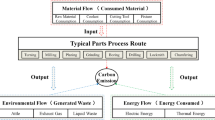Abstract
Low-carbon manufacturing (LCM) is increasingly being regarded as a new sustainable manufacturing model of carbon emission reduction in the manufacturing industry. In this paper, a two-stage low-carbon scheduling optimization method of job shop is presented as part of the efforts to implement LCM, which also aims to reduce the processing cost and improve the efficiency of a mechanical machining process. In the first stage, a task assignment optimization model is proposed to optimize carbon emissions without jeopardizing the processing efficiency and the profit of a machining process. Non-dominated sorting genetic algorithm II and technique for order preference by similarity to an ideal solution are then adopted to assign the most suitable batch task of different parts to each machine. In the second stage, a processing route optimization model is established to plan the processing sequence of different parts for each machine. Finally, niche genetic algorithm is utilized to minimize the makespan. A case study on the fabrication of four typical parts of a machine tool is demonstrated to validate the proposed method.
Similar content being viewed by others
References
Department of Energy Statistics National Bureau of Statistics People’s Republic of China. China Energy Statistical Yearbook 2016. Beijing: China Statistics Press, 2016 (in Chinese)
Ma F, Zhang H, Hon K K B, et al. An optimization approach of selective laser sintering considering energy consumption and material cost. Journal of Cleaner Production, 2018, 199: 529–537
Liu Y, Liu X, Zhao J. Research on job-shop scheduling optimization method with limited resources. International Journal of Advanced Manufacturing Technology, 2008, 38(3–4): 386–392
Tang D, Dai M, Salido M A, et al. Energy-efficient dynamic scheduling for a flexible flow shop using an improved particle swarm optimization. Computers in Industry, 2016, 81: 82–95
Mouzon G C, Yildirim M B. A framework to minimise total energy consumption and total tardiness on a single machine. International Journal of Sustainable Engineering, 2008, 1(2): 105–116
Mouzon G C. Operational methods and models for minimization of energy consumption in a manufacturing environment. Dissertation for the Doctoral Degree. Wichita: Wichita State University, 2008
Giglio D, Paolucci M, Roshani A. Integrated lot sizing and energy-efficient job shop scheduling problem in manufacturing/remanu-facturing systems. Journal of Cleaner Production, 2017, 148: 624–641
Salido M A, Escamilla J, Barber F, et al. Energy efficiency, robustness, and makespan optimality in job-shop scheduling problems. Artificial Intelligence for Engineering Design, Analysis and Manufacturing, 2016, 30(3): 300–312
Li L L, Li C B, Li L, et al. An integrated approach for remanufacturing job shop scheduling with routing alternatives. Mathematical Biosciences and Engineering: MBE, 2019, 16(4): 2063–2085
Piroozfard H, Wong K Y, Wong W P. Minimizing total carbon footprint and total late work criterion in flexible job shop scheduling by using an improved multi-objective genetic algorithm. Resources, Conservation and Recycling, 2018, 128: 267–283
Zhang C, Gu P, Jiang P. Low-carbon scheduling and estimating for a flexible job shop based on carbon footprint and carbon efficiency of multi-job processing. Proceedings of the Institution of Mechanical Engineers. Part B, Journal of Engineering Manufacture, 2015, 229(2): 328–342
Zhang Y, Liu Q, Zhou Y, et al. Integrated optimization of cutting parameters and scheduling for reducing carbon emissions. Journal of Cleaner Production, 2017, 149: 886–895
Lei D. Novel teaching-learning-based optimization algorithm for low carbon scheduling of flexible job shop. Control and Decision, 2017, 32(9): 1621–1627 (in Chinese)
Zhou G, Tian C, Zhang J, et al. Multi-objective process route optimization considering carbon emissions. International Journal of Advanced Manufacturing Technology, 2018, 96(1–4): 1195–1213
Verfaillie H A, Bidwell R. Measuring eco-efficiency: A guide to reporting company performance. World Business Council for Sustainable Development, 2000
Cao H, Li H, Cheng H, et al. A carbon efficiency approach for life-cycle carbon emission characteristics of machine tools. Journal of Cleaner Production, 2012, 37: 19–28
Jiang Z, Ding Z, Zhang H, et al. Data-driven ecological performance evaluation for remanufacturing process. Energy Conversion and Management, 2019, 198: 111844
Zhu S, Jiang Z, Zhang H, et al. A carbon efficiency evaluation method for manufacturing process chain decision-making. Journal of Cleaner Production, 2017, 148: 665–680
Li C, Tang Y, Cui L, et al. A quantitative approach to analyze carbon emissions of CNC-based machining systems. Journal of Intelligent Manufacturing, 2015, 26(5): 911–922
Deb K, Agrawal S, Pratap A, et al. A fast elitist non-dominated sorting genetic algorithm for multi-objective optimization: NSGA-II. In: Schoenauer M, Deb K, Rudolph G, et al., eds. Parallel Problem Solving from Nature PPSN VI. PPSN 2000. Lecture Notes in Computer Science, vol 1917. Berlin: Springer, 2000, 849–858
Mirjalili S. Genetic algorithm. In: Mirjalili S, ed. Evolutionary Algorithms and Neural Networks. Cham: Springer, 2019, 43–55
Ma F, Zhang H, Gong Q, et al. A novel energy evaluation approach of machining processes based on data analysis. Energy Sources, Part A: Recovery, Utilization, and Environmental Effects, 2019 (in press)
Ding Z, Jiang Z, Zhang H, et al. An integrated decision-making method for selecting machine tool guideways considering remanufacturability. International Journal of Computer Integrated Manufacturing, 2018 (in press)
Acknowledgements
The work described in this paper was supported by China Postdoctoral Science Foundation (Grant No. 2018M642935), the Plateau Disciplines in Shanghai, and the National Natural Science Foundation of China (Grant Nos. 51905392, 51775392 and 51675388). These financial contributions are gratefully acknowledged.
Author information
Authors and Affiliations
Corresponding author
Rights and permissions
About this article
Cite this article
Zhu, S., Zhang, H., Jiang, Z. et al. A carbon efficiency upgrading method for mechanical machining based on scheduling optimization strategy. Front. Mech. Eng. 15, 338–350 (2020). https://doi.org/10.1007/s11465-019-0572-8
Received:
Accepted:
Published:
Issue Date:
DOI: https://doi.org/10.1007/s11465-019-0572-8




